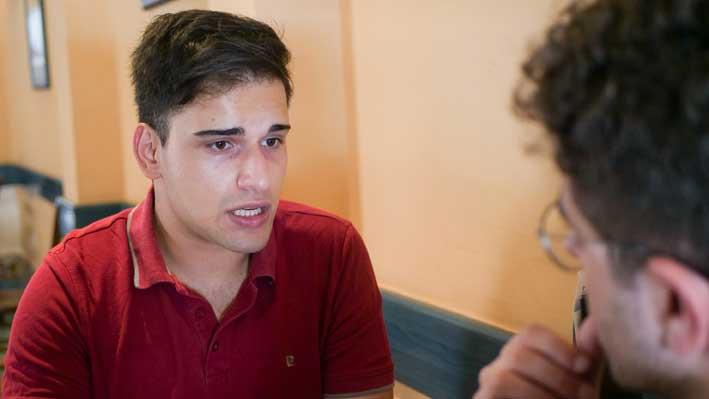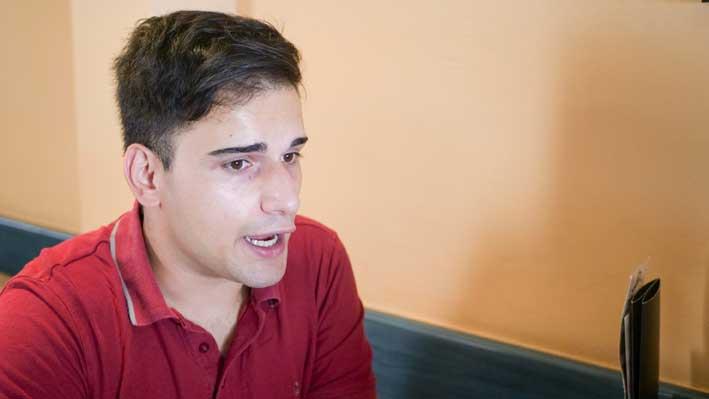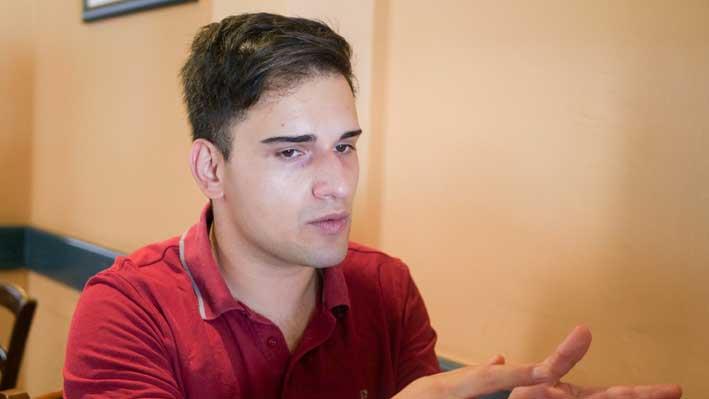A tender launched in February which would require the winning company to provide HIV related services was too vague in its description of what is expected of the company, Lawyer Mark Josef Rapa said.
The tendered HIV services were noted to include continuous follow-ups, education, and training to healthcare professionals and patients with the main focus on adherence.
In an interview with this newspaper, Rapa who is the founder of PrEPingMalta, a member of the European AIDS Treatment Group, a lawyer and a teaching assistant at the Centre for Social Ethics and Policy at the University of Manchester, insisted that the general public is entitled to know what is going on – particularly because HIV is a public health concern.
“It has to make things clear – the staff at the GU clinic need to know what is going to happen, and we also need to know what is going to happen as activists, since we base our campaigns on the information we have.”
Apart from no clear indication of what is expected of the company, Rapa also criticized the lack of specificity when it came to the company being tasked with bringing the newest treatment to Malta – with only the European guidelines being referred to in the tender itself.

“The issue is that there is nothing in the contract which binds the company to providing the single tablet which would cover all three drugs (needed for treatment).”
Giving the best possible treatment, he explained, would be both in the interest of the government and of the public.
“The issue with a private partnership, which nobody knows if that is what is intended, is that there is a chance that the government will be paying much more money to a private company when it could provide the services itself at a lesser price.”
Earlier in the year, this newspaper reported that an investment of €1 million was being budgeted for a project through which the current treatment available to HIV patients locally will be changed to a different therapy – this through a call for companies, joint ventures and consortiums to put in place international clinical guidelines, whilst the Central Procurement and Supplies Unit wished to provide an integrated service offering a variety of treatments, follow-up services and even education.
It was also noted that according to statistics from the World Health Organisation, 2017 saw another year of disturbing numbers of new HIV diagnoses in the WHO European Region. Rates of HIV diagnoses have increased by 50% in Malta, alongside countries such as the Czech Republic, Hungary and Poland.
This could potentially be attributed to increased public awareness and people being encouraged to be tested for HIV, although nothing can be ruled out.

PrEPing Malta
Having just celebrated its first anniversary, PrEPing Malta is very much in the thick of it when it comes to this area of public health.
Dr Mark Josef Rapa founded the website as a web-based activist portal, along with a Facebook page, with the intention of it being used to provide information to people on HIV, HIV prevention and also sexual health in general.
“We decided to come up with this because we realised that there was a vacuum in the central health services where people were reading about PrEP on international websites, but then had no idea what was happening locally or how to access it.”
His website states that “Pre-Expsosure Prophylaxis - worldly referred to as PrEP - is a pill which prevents the acquisition of HIV in 99% of the cases. The drugs in the pill (Tenofovir and Emtricitabine) are the same two drugs which can make part of Antiretroviral regimen (ARV)– the treatment prescribed for HIV.”
He explained that information on an international website may not necessarily be good information for people living locally in Malta since the same might not apply, so this was done to try and bridge those international websites with Malta, and at the same time campaign for the introduction of Prep in Malta.
Whilst Prep has been around for quite a while, and the data and the science was available in the 2000s, the ability to push something like PrEP requires both financial and human resources and Rapa noted that with “us being a very conservative country when it comes to sex in general, then it’s going to be more difficult for the department to just say "let's talk about sex".

What about the HIV-related services?
Fast-forward to the tender that was launched in February and closed in April, for which four companies applied – the idea was for the winning company to provide HIV services, or two companies since there is the possibility of two companies coming together which the government will decide in the negotiation of the tender.
“In the actual tender, we find that HIV services include the monitoring, follow-up and education on adherence - what is actually expected of the company is very broad - it is not just the supply of anti-retroviral therapy, which is the combination of drugs that people with HIV take on a daily basis.”
Rapa raised several questions to which the answers were still up in the air due to the terms of the contract being unclear.
"Does the contract extend to other things?"
"Does it extend to going to schools to educate?"
"If the company is in charge of lab results, then is the company going to be receiving data? And what is the company going to do with the data it receives? Will the government have access to that data? Or is the data that is coming out from this tender going to become privatised? That is one of the main concerns - are we saying that we are going to privatise?
“The fact that the government gets medication from a supplier is a normal standard procedure, but if I am extending that to other services then the general public is entitled to know, and in this case in particular, because HIV is a public health concern.”
Rapa insisted that since HIV is an infectious disease, then the government should make things clear, especially because the HIV LGBTIQ action plan includes the improvement of medication, which shows a commitment of the government to reduce the new infections of HIV.
“It has to make things clear - the staff at the GU Clinic need to what is going to happen; we need to know as activists what is going to happen because, as activists, we base our campaigns on what information we have.”

The GU Clinic is not mentioned in the tender.
If you've tested positive then you're transferred from the GU Clinic to the HIV services which fall under Infectious Diseases, which is still a public service, but, the consultants who deal with infectious diseases in Malta have to deal with all other infectious diseases.
“Abroad, because of the number of cases, they only deal with HIV.”
“As things stand there is no clear indication of what is expected of the company. We understand that the company is in charge of getting the newest treatment but it doesn't specify what type of treatment apart from referring to the European guidelines.”
Here Rapa, again, noted the lack of information - this time when it came to the medication that could potentially be prescribed to patients.
Whilst the guidelines note the first-line regimen, which is to be considered the gold standard, he said that there is nothing in the contract which binds the company to provide it or on what happens when the guidelines update the regimen in question.
"It also doesn't give us information on whether the medication that the company has to provide has to be a single tablet or different tablets," he explained, clarifying that the guidelines also give the drug combination.
Treatment and Prevention
The treatment for HIV is of three or more drugs.
Truvada has two drugs in it, and you still need other medication to supply the other drugs, but usually you can get other combinations.
Rapa said the issue is that there is nothing in the contract which binds the company to providing the single tablet which would cover all the three drugs.
Prescribing three tablets could increase the pill burden, which follows the EU’s idea of going into the single-drug regimen.
“There is ample research that says that with one pill a day adherence goes up, as opposed to taking three tablets three times a day.”
"Why should we make it easier for the patient? Because if the patient is given the best possible treatment then the chances are that the virus becomes untransmittable."
"It is in both the government's and the public's interest that we give the best possible treatment."
The main issue, he again insisted, was that we do not know what is being negotiated behind closed doors.
“What we know from the terms of the contract and the call for application is that there are too many loopholes and vague things, and at some point, it was asking the applicants to be creative.”
“The issue with a private partnership, which nobody knows if that is what is intended, is that there is a chance that the government will be paying much more money to a private company when it could provide the services itself at a much lower price.”
The contract also didn't extend to the provision of prevention, although Rapa did note that Truvada can also be used as PrEP.
"Why are we giving a contract to a company to provide several drugs, when that company could also extend the terms and provide drugs for PrEP when they are all the same drugs?"
"It's not practical, and it continues to delay the introduction of PrEP."
As things stand the number of HIV cases is going up, which is alarming when you take into consideration that we're seeing decreased in other countries, he said
In England, where the service is public and not private, “within a space of two years we have seen a 55% decrease in new HIV cases.”
“This is because PrEP is effective - and there also exists a test and treat system where when a person comes into the clinic and gets tested for an STI or HIV there's a treatment within the same day.”
“If you're HIV positive then you get your treatment on the very same day, which is beneficial as you are immediately attacking the virus, and the quicker you do that then the quicker the virus becomes undetectable and untransmittable.”
"Immediate treatment - test and treat."
“What this does is get people into the service and allows the STIs to be caught early on, which is great considering the difficulty was getting people to be tested.”
“What we are trying to do is get people to be in control of their sexual health, and by doing so we are creating cost-effective measures for the NHS.”
“If you look at it from a financial perspective on its own, it just makes sense.”